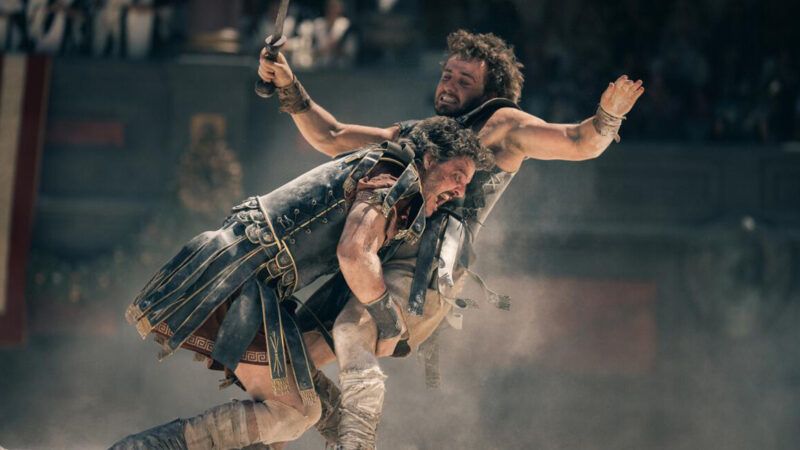Review: Gladiator II Is a Historical Epic About the Dangers of Political Power
Director Ridley Scott explores what happens when people from the fringes of society rise to power.

Gladiator II explores the allure and dangers of political power, focusing on those who rise from the fringes of society to become central figures in the Roman Empire. Like its Oscar-winning predecessor, the film follows a Roman warrior turned slave who fights for a vision of a free and equal Rome.
The film's most compelling figure, though, is a former slave, portrayed by Denzel Washington, who has ascended to owning his own group of fighters. Driven by ambition, he employs violence, manipulation, and flattery to climb the Roman power structure.
Directed by Ridley Scott—the filmmaker behind Alien, Blade Runner, Thelma & Louise, and The Martian—Gladiator II mirrors the bleak but humanistic themes of his previous works, especially his most recent film, Napoleon. Scott is an expert at presenting a humanistic critique of individuals consumed by the desire for control.
Gladiator II is not without flaw. But it works as both an epic historical melodrama and a meditation on the sacrifices and moral decay that accompany the pursuit of power, both for the powerful and the powerless.
Editor's Note: As of February 29, 2024, commenting privileges on reason.com posts are limited to Reason Plus subscribers. Past commenters are grandfathered in for a temporary period. Subscribe here to preserve your ability to comment. Your Reason Plus subscription also gives you an ad-free version of reason.com, along with full access to the digital edition and archives of Reason magazine. We request that comments be civil and on-topic. We do not moderate or assume any responsibility for comments, which are owned by the readers who post them. Comments do not represent the views of reason.com or Reason Foundation. We reserve the right to delete any comment and ban commenters for any reason at any time. Comments may only be edited within 5 minutes of posting. Report abuses.
Please to post comments


The movie reviews on this site are incredibly timely.
Scott's movies are period pieces, but their relation to history is mostly theoretical. Napoleon was a failure and misleading in whose story it was.
The old Hercules show was as historically accurate as this nonsense.
They're not period pieces.
They're cosplay. They are inaccurate to the period and completely ignored the reality of the historical characters portrayed.
Gladiator II is a remake of Gladiator I.
It has the same plot and executes it poorly, making it incredibly dumb.
Macrinus is the worst character in the movie. His motivations aren't the ones of a manumitted slave in the Roman Empire. Instead it is the ones of a slave in the deep south before the US Civil War.
Slavery was widely practiced during the Empire (and the world for that matter). Sub-Saharan Africans were not singled out to be slaves. Slavery was not a life long sentence as almost all were freed by their masters at some point. Freed slaves became citizens and were given money to start out. Their children could run for office and even rise to be senators.
Macrinus took that freedom (given him to by Marcus Aurelius himself) and cash and built a respectable legacy of wealth and power, including owning slaves. Wanting to bring down the Empire because it enslaved him, makes no sense and reeks of historical revisionism.
The movie has many, many flaws that ruin it, but the above is its greatest.